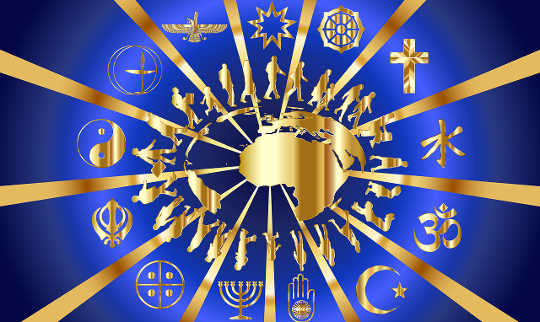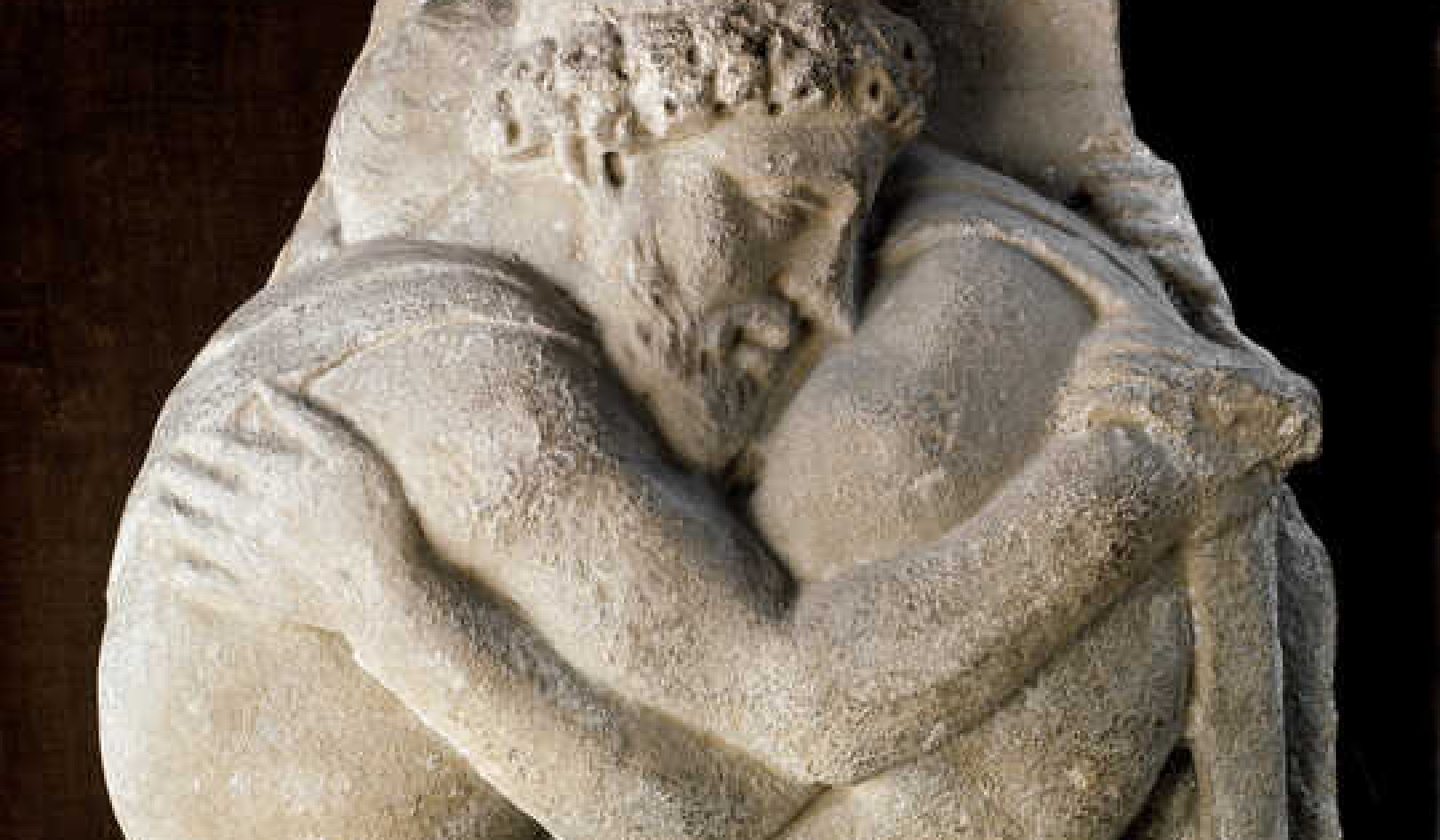
Image by Gordon Johnson
When one studies and understands the main concepts and teachings of the great religions, it becomes obvious from their similarities that they come from the same source of inspiration: God Divine Energy. Even if these concepts were not so similar, it is obvious that there cannot be a Supreme God for each different part of the world.
Thus, we must realize and accept that there is only one God, one Truth, and many religions. No religion has the exclusivity of God or Truth, for all were created by men inspired by the same and only God, just to help others fulfill the strong spiritual needs we all have.
We must realize that all religions are directed by human beings, and none of us is perfect. Therefore, they are not always well-directed and many mistakes are committed. Sometimes we can experience the blessing of finding a swami, a rabbi, a monk, or a priest with a high level of consciousness and love, but this is rare.
Thus, for our own good and regardless of circumstances, we must develop a private and personal relationship with that harmonizing being or force that we call God. Thereafter, we can enjoy the benefits and rituals of one or more religions, accepting what sincerely feels right and rejecting what does not.
When a religious leader insists on proclaiming the exclusivity or superiority of his religion, or on teaching confusing dogmas or rituals, he is not coming from God but from his own confused mind. These kinds of men are not very helpful; on the contrary, they are creating negativity, separating man from man, brother from brother, creating confusion and hatred.
Only when most of humanity realizes that there is only one God and many religions, then mankind will get on its way to evolving towards higher levels of well-being.
All Religions Are Sustained By Us
We all have a strong natural need to somehow give spiritual nourishment to that part of God that dwells inside of us. Besides, it is the only way to attain peace of mind, feel good, and successfully go through life. As we try to fulfill this imperative need, most of us attend a church or a temple or some kind of congregation or other, thus sustaining such organizations with our attendance.
As many of us know, for most, the only way to get ever closer to God's harmony and well-being is by consciously practicing various spiritually-oriented activities. As this requires some effort, especially at the beginning, it is usually easier to perform these practices in the company of other people as a source of inspiration and support. The main reason religions came to exist, created by men, is to offer all of us a favorable environment to worship and practice. The word "religion" comes from the Latin word religare, which means "to unite, to bind together . . . to unite with God".
It can be wonderful to be part of a religious group that is really helping us become better and happier human beings, but, when this is not the case, we must find another way to better satisfy such an important need through another group or organization, or whatever feels right.
If we are really honest with ourselves, we know what feels right. Thus, to fulfill the imperative of spiritual nourishment or when looking for the right place to fulfill this necessity, most human beings, at some point, attend some kind of church or temple or group, usually getting something positive out of it. Yet, to be really successful, we must realize that this is an individual process. We can only reach higher levels of consciousness and well-being by sincere conscious practice in our homes, by our own individual effort, not by blindly attending a temple, synagogue, church, or mosque.
Therefore, we must have respect and tolerance for other people's individual process. We should accept and respect that each person or group of persons may have a different way of approaching worship, or a different way of getting closer to God's harmony; it all depends on their level of consciousness. We should realize that most people do their best to fulfill their spiritual needs, and they can only follow their own process.
We are all brothers and sisters created by one God and living under the same roof. We are not feeling and understanding God's will and love when we do not accept, love, and respect all of creation, beginning with ourselves. Those who do not accept and tolerate other people's religions or ways of worship are not with God.
Thus, to get closer to God's wonderful well-being is ultimately an individual effort; we do not depend on any religion to achieve that. Yet, all religions depend on us.
One night, before going to bed, I went out to see the sky; it was clear, full of stars. So the next morning I got up at four-thirty and, in Robert's car, drove to Key Biscayne to watch the sunrise.
In the windless, quiet space I walked towards the middle of the beach and placed a towel on the sand near the water, sat in cross-legged position, facing the ocean, and concentrated on my breath.
Each new breath made me feel better -- ever more love and peace and joy. I felt very grateful for all the love and all the protection and all the beauty that my Father was letting me experience.
Opening my eyes now and then, I waited and waited as the sky turned clearer -- consciously breathing, sometimes looking, enchanted by the ever-changing purples, pinks, violets. Just breathing and looking at those spellbinding colors, absorbing them all deep into my being. Intensely waiting for the ultimate priceless gift.
Each new breath brought more joy, peace, well-being. I breathed deeply, fully, trying to fill my entire being with all the best my Father would give me. Deeply, fully....
Finally, the great ball of fire started to appear, gently, slowly emerging from the water, so exciting, so generous, so powerful. Amazing vision, magical performance of nature, miracle. I remained there, fixed, until all the magnificent vision was up in the air.
I walked back to the car feeling absolute, complete well-being. I left having realized why so many people, since very ancient times, have worshiped the rising sun.
Main Differences Among The Great Religions
Perhaps the most important difference between the religions originating in India and those originating in the Middle East is their concept of God and our relationship to It.
To the religions originating in India, God is everywhere, in all of nature, within us. Thus, God is absolutely close to us, most accessible, and easy to relate to. We can and should relate to It directly and individually, and establish a beautiful and rewarding relationship with It. We do not need mediators such as monks or priests between us and God. Most of the people who devote their lives to the practice and teaching of these Oriental religions, such as swamis or monks, are not mediators but instructors -- just instructors of the activities they consider necessary for others to practice in order to get closer to God.
In the religions originating in the Middle East, especially Christianity, the concept prevails that God is above and beyond, far away from us, looking down from some distant point, observing everything we do in order to judge and punish. Thus, God is not easy to reach, not easy to relate to, too good to be near us. Here God is considered, by most, to be some powerful being mainly concerned with watching everything we do in order to approve or disapprove and, depending on our behavior, send us to heaven or to hell after death. We can relate to him individually, but we also definitely need the help of mediators who, supposedly, are much closer to God than any of us.
These two distinct ways of relating to God make a great difference to the millions of followers of the great religions. In the first there is the definite chance of establishing a real, positive, and beautiful relationship with God; but in the second, so many of these mediators, so far from God's truth and ways, often create confusion and negativity.
Another important difference is that the religions originating in India teach that we can experience the bliss of heaven here and now, that we can get to be "one with God" during this life on earth. It only depends on how close we get to God's harmony and will by conscious, daily practice of the right activities.
The religions originating in the Middle East, especially Christianity, mostly teach that, depending on our behavior here on earth and on God's judgment, we either become worthy, or not, of experiencing heaven, but only after we die, in the afterlife. We must wait till after death in order to get the best reward. Yet Judaism does not talk much about the afterlife.
The first concept is certainly more attractive, more compassionate, more Godlike. If we can attain the experience of heaven during this life on earth, then we have much more motivation to try to get closer to God's will, for it is now that we can be sure we are living and feeling. This concept seems more realistic and humane, and makes life much more interesting.
The second point of view seems abstract, unrealistic, and unfair, imposing hard conditions for the highest prize and portraying God as a ruthless judge. It is a concept somehow devoid of God's compassion, constant help, and love, a concept which our hearts cannot really accept and which creates confusion in our minds.
The Concept of Sin
The third significant difference is that the religions coming from India have no concept of sin. A man simply commits errors or mistakes and suffers the negative consequences, then reams from the negative experience not to commit the same negative actions again.
It is human to err and learn. It is a continuous learning process without guilty feelings, and this is why we are here. It is a process of getting ever closer to God's harmony by gradually learning to avoid negative actions. The spiritual pain and negative results of the experience will lead us to learn right from wrong.
The Middle Eastern dogmas, especially Christianity, mainly teach that we all are born sinners, that a man commits sins and that these negative actions can only be forgiven through repentance before God or through one of Its earthly representatives; a priest. Here a man is considered a sinner and deserves punishment and scorn.
This concept creates guilty feelings in individuals and the whole group, who are constantly criticizing and judging one another, ready to start committing new sins since they can always be pardoned. Here it is difficult to learn and evolve for the better because improvement does not depend on us but on the will of God.
It becomes almost impossible to have healthy communities with the concept of men being eternal sinners, bad persons. This negative concept of sin certainly contributes to much of the aggression that constantly disturbs the relationships among human beings.
The teachings of the Great Masters have always been very clear and simple. It has been some of the disciples and organizers of religion who have established complicated and mysterious dogmas in order to appear as the only ones who understand God and who therefore act as mediators. As they appear to have spiritual ascendancy over the rest of the population, they can also exercise a great deal of control.
Reprinted with permission of the publisher, Blue Dolphin Publishing, P.O. Box 8, Nevada City, CA 95959. Visit their website at www.bluedolphinpublishing.com Orders: 1-800-643-0765.
Article Source
The Highest Knowledge
by Aurelio Arreaza.
 A book on how to make each day an ever-creative, exciting, and joyful experience.
A book on how to make each day an ever-creative, exciting, and joyful experience.
We all have a powerful energy-soul within, Source of creativity, freedom, love, and well-being. To take appropriate care of our body and mind, we must connect with our energy-soul and evolve towards ever higher levels of spiritual and material well-being, while keeping ourselves forever young.
About The Author
 Aurelio Arreaza was born and raised in Venezuela in a socially conservative atmosphere. As an inquisitive youth, he read spiritual books, talked to God, and began to feel a small amount of God's harmony. After completing law school, he lived, as he puts it, "a traditional materialistic existence."
Aurelio Arreaza was born and raised in Venezuela in a socially conservative atmosphere. As an inquisitive youth, he read spiritual books, talked to God, and began to feel a small amount of God's harmony. After completing law school, he lived, as he puts it, "a traditional materialistic existence."
He found this lifestyle unfulfilling and fully returned to his spiritual search. This led him to attend many different spiritual learning centers and experience different types of spiritual practices. He studied the human body and mind in great depth. Eventually, he left Venezuela and moved to the Sivananda Yoga Center in New York.
After more years of learning and spiritual practice, he found himself writing, in a clear and simple way, what he considers the most important knowledge concerning mankind: how to better understand and enjoy life, to gradually improve its quality and tune in with the rhythm of Universal Harmony. He is also the author of Fountain of Joy & Youth: Teachings of the World's Great Masters on Body, Mind & Soul

























